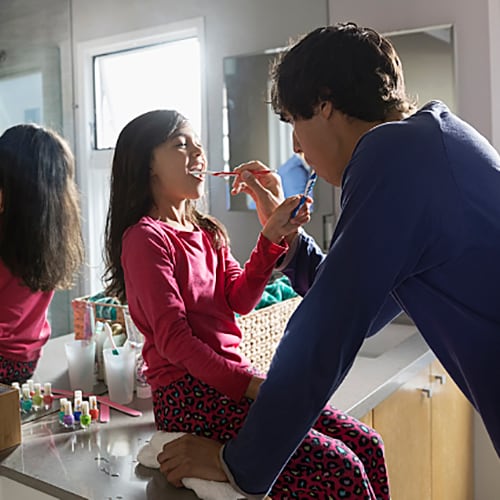Dental hygienists have 3 ways to conserve water: in the office, with patients and at home. Some parts of the world do not have access to clean, usable water. Fresh water is a limited resource so it's important that we use it wisely. Here are some tips on how you can begin to take steps to advocate for a better world through water conservation.
In the Office
Dental hygienists rely on water to perform many tasks throughout the day. According to the Eco Dentistry Association, dental hygienists can conserve water in the office by following the Centers for Disease Control's guidelines for the dental setting, and using an alcohol-based hand rub instead of soap and water when appropriate. When hand washing is required, turning the faucet off while lathering is also a great way to conserve water.
Additionally, you can take a few steps to ensure your office is conserving water. Check to make sure that faucets do not leak. If they do, replace them so that water is not wasted. Check toilets to make sure they do not continually run after being flushed. Newer toilets also require much less water to fill and flush, making them a simple way to conserve water.
With Patients
Turning off the faucet while brushing can save up to 8 gallons of water per day, according to the Environmental Protection Agency (EPA). If just one individual turned off the faucet while brushing twice every day, they would save up to 2,920 gallons of water in one year! Sharing this information with patients is a great way to begin a conversation about conserving water.
Dental hygienists can direct patients to Colgate's Save Water consumer campaign with the hashtag #EveryDropCounts, where they can pledge to turn off the faucet to help save water.
At Home
There are many ways you can conserve water at home. Simple steps to get started include taking shorter showers or not letting the faucet run while shaving. Also, replacing old faucets and toilets will eliminate leaks and reduce water consumption in your home.
Consider replacing inefficient appliances, too. For example, newer washing machines are more efficient because they use a lot less water than older models. When replacing appliances you may also be eligible for a rebate through several Energy Star regional partners.
Another step you can take is to cut back on watering plants and your lawn. Indoors, instead of letting water run down the drain while waiting for it to warm up, you can catch the cold water and use it to water plants. Dragging out a garden hose to water outdoor plants and the lawn can waste a lot of water. Instead, set up a rain barrel that catches the water that runs off the roof. You can then sprinkle that water on your greenery. Some states or cities even offer these eco-friendly barrels for free. The EPA points out, "It's a great way to conserve water and it's free water for use in your landscape." However, you must be careful when using rain barrel water on edible plants as it may contain pollutants.
Takeaways
- Turn off the faucet while lathering hands, brushing teeth or shaving.
- Encourage patients to participate in saving water by telling them about the Colgate Save Water campaign.
- Recycle water for use on plants or the lawn to conserve water at home.
Why It's Valuable
When we take steps to conserve water, we are helping to make a better world. The 3 ways to conserve water (in the office, with patients and at home) will help dental hygienists do their part and encourage others to do so, as well.


Was this article helpful?
If you’d like a response, Contact Us.